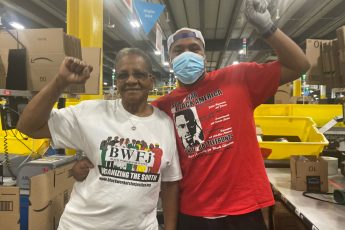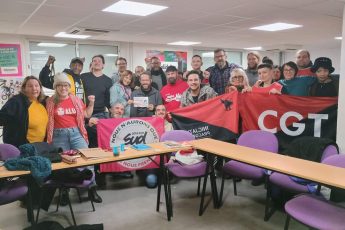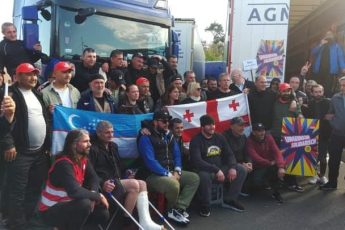
We publish the second text, written by activists from Georgia and Solidarity Network – Workers Centre Tbilisi who joined the TSS Platform, around the logistical transformation of the Georgian territory and the challenges it poses to labour organizing (click here to read the first article). The text highlights how logistics planning, the opening of new workplaces and the requalification of old ones work because Georgia has been turned into a waste land in terms of social and labour rights. This is the specific asset Georgia can offer to global logistics: not only a cheap labor force, but one that is supposedly willing to accept any condition because it is haunted by poverty and lacking any social benefit. The question is how to confront the combination of a widespread deregulation of labour conditions and the flexibility required by logistics. Logistics is not only introducing new working conditions, but at the same time it is making use of already existing political and social conditions. The rise of a nationalist drive in the country, for instance, is predictably very much in tune with the need of logistics to exploit differences along nationality and skill lines: while for sure the logistic turn will bring on the territory a more substantial migrant labor force, everything is being set up for assuring oneself that no communication takes place among different nationalities. Therefore to organize transnationally against the logistics of exploitation means tackling nationalism and wider political conditions of exploitation, that affect workers inside and outside the workplaces. All these issues and many more will be discussed during the TSS logistics meeting that will take place in Stockholm, 23-24th November 2018.
The weakness of Georgia’s labour code is a key factor behind its ability to attract substantial logistics investments. This is made explicit during the Belt and Road Forum, the official New Silk Road convergence held last November in Tbilisi. Throughout the many presentations where Georgia’s assets are presented to a public of investors, Georgian workers are repeatedly defined as a: ‘competitively priced workforce’. Georgian legislation does not include minimum wage regulation which, paired with the absence of an effective system of labour inspections, guarantees a cheap and highly blackmailable labour force. Moreover, in Georgia today there are already four free industrial zones (FIZ) and more are planned to be operative by 2020. The workings and territorial organization regimes at play in these zones emerge in this forum as the model to be imitated for the logistic development of the whole country. Within these spaces, rights recognized as fundamental – at least on paper – for the citizens of a state, such as the right to express dissent, are denied, for the benefit of more fluid, seamless, exchange processes where efficiency and rapidity seek to dominate over human functions and needs.
In official accounts of current developments, although, it is often indicated that infrastructure investments will produce a large number of jobs, it is never specified what kind of employment, for whom, and under what conditions. Consequently, the labor force is only discussed as a commodity, one of the various ‘assets’ that Georgia has to offer potential investors.
The tension between the future (desired) and current regimes of labour exploitation is what we are going to explore in this text. Interestingly, Anaklia Development Consortium – the company building one of the major logistics developments in Georgia, the deep sea port of Anaklia – is admitting the ineffectiveness of Georgia’s labor code, promising to upgrade it to higher the standards. The company is also promising to employ a majority of Georgian workers, focusing especially on the population of the region where the port will arise. This is part of their corporate social responsibility image and their bid to appear as guarantors of a modern and sustainable path to development. However, while the founder of Anaklia Development Consortium, Mamuka Khazaradze openly talks about the lack of skilled labor force (that 70% of job applications received by the consortium were for driver jobs), no effort has been made to this day by the government to upgrade the skills of the labour force. The lack of a comprehensive government plan to train workers across different sectors and areas of the country means that the will of some private sector companies to train their own future employees is the only force behind investment in vocational training.
Labour before logistics
In the case of Georgia, the seamless exploitation to which logistics firms aspire, inserts itself in a context of grave and generalised violation of the most basic workers’ rights and the lack of appropriate structures for reclaiming them. In the current contexts, low salaries are matched by inappropriate health and safety conditions, which have led to the staggering number of 1212 labour related deaths and injuries since 2011. Moreover, the dismantling of social security systems achieved by the Saakashvili government – this includes the privatization of healthcare which has only partially being reformed by the current government and a pension system which grants a flat contribution of 160 lari monthly (55 euros) and the total absence of social housing provision – has driven a large part of the working population into poverty.
In this short overview we try to advance some questions regarding the potential impact of logistics developments on Georgia’s labour force. We do this by illustrating the current state of labour relations in Georgia, focusing especially on the industrial and the service sector.
Union Activity and Perspectives for Organising
Since the collapse of the Soviet Union the country has undergone a process of deindustrialization and labour deregulation, leaving a workforce of largely low skilled workers, prey to the whims of foreign and local capital. Here, like many other countries in the context of neoliberal fragmentation of the labour force, established unions are failing to organise that great portion of workers who fall in the cracks of labour categories: day labourers, informal labourer and the expanding number of precarious service sector workers. During Saakashvili’s presidency (2003-2012), labour inspections had been abolished as part of his hardline neoliberal agenda and were only reinstated by the current ruling party in 2013. Mild and mostly unsuccessful attempts have been made by the current government to establish stronger workers’ rights. Currently unions are mostly weak and concentrated only on specific sectors such as heavy industry and railways. This is partly a result of an ongoing distrust of institutional unions. In Soviet times – as Tatuli Chubabria, a former researcher of human rights NGO EMC, explains – trade unions were not trusted, as they were seen as a tentacle of the party. Since then, industrial production fell, agriculture turned to subsistence farming. Moreover, the majority of industrial companies still have functioning ‘yellow trade unions’, which are controlled by the the companies themselves and are never loyal to workers’ interests.
Against this background the development of leftist and socialist politics is new in Georgia, and the connection between leftists and the people has been slow to grow. Independent unions such as Solidarity Network – Workers’ Centre and Ertoba2013 (Unity2013) are forced to operate amidst harassment not only from corporations and the state, but also from mainstream unions who have been known to target their members and disrupt their organising practices.
Recent workers’ struggles
Against this background, in the recent months struggles have taken place in Georgia to counteract the unfair and dangerous labour regime to which most workers are exposed. Here we will briefly focus on three examples which can illustrate the main problematics on which the development of logistics rests.
- Tqibuli:
In April, the coal production town of Tqibuli, in west Georgia, saw the lastest of a very long series of deadly accidents. Six miners died, and three were seriously injured, due to an infrastructural failure. The coal mine, Mindeli, is owned by the Georgian Industrial Group, which had previously been at the centre of critique for its non compliance with the most basic safety regulations. In a report by the Georgian labour NGO, EMC, it is shown how independent labour inspectors had previously examined the mine’s health and safety compliance raising serious concerns about the worker’s conditions, which had led to a previous fatal accident in 2017, counting four dead. Despite this, the inspector’s recommendations had been obstinately ignored and at the time of the most recent accident the accounts from inside the mine are spine-chilling. The most basic health and safety norms are violated every day, as workers are forced to work on obsolete machinery – the break of one of the carriages used to enter the mine had been replaced with a piece of wood – and most degrading sanitarian conditions as the mines lack toilet facilities all together.
This tragedy, which sparked protests from activists in Tbilisi and other major cities, raises a question on the impact of transnational logistics, and the labour deregulation it rests upon, on a labour environment where this kind of deregulation is already the norm. Will the tension between the current absence of labour security and basic rights and the modern, yet casualised, working environments promised by logistics firms function as an obstacle to potential organising? Will logistics firms just incorporate current practices or will they seek to produce more ‘efficient’ and controlled working environments?
- Agara:
In October 2017, the sugar factory in Agara, a small Soviet-planned industrial town north of Tbilisi, was shut leaving 481 workers unemployed. After a number of demonstrations, a permanent campsite outside the factory and a 100 miles march from the village to Tbilisi, the workers’ managed to reach an agreement with the company, through the mediation of the state, for reopening the factory from June 2018. During the closure, the factory grounds were allegedly being refurbished to host BitCoin mining. This conflict presets two interesting elements related to Georgia’s logistical future. Firstly the rise of Cryptocurrency mining and second the impact of recent Free Trade agreements on the country’s industry. The official reason behind the factory’s closure in fact is the impact on EU export regulation on the sugar market. As a result of the European Union’s lift on its own export quotas, the international sugar price fell to $350 per metric ton, a price much lower than the cost of production in Agara. The Georgian government politics which

relies on competition and deregulation is effectively pricing out its own industry.
While sugar production is coming to a halt, cryptocurrency mining is gaining popularity in the country. One of the currently existing FIZ is owned by cryptocurrency giant BitFury and Agara is not the only establishment converting into a mining factory, as more are appearing in the regions of Khaketi and Kartli. Cryptocurrency mining is an extractive industry, which while producing an immaterial value and being known to produce very few jobs is relying on a very tangible energy consumption. In this the case of Georgia, Bitfury has been granted a preferential price on electricity, directly contributing to the exploitation of Georgia hydropower.
- Metro workers:
The latest instance of workers’ struggle, however, is a positive one and particularly relevant for thinking about possible struggles in the logistics sector. The first week of June 2018 metro workers in Tbilisi went on strike, paralysing urban transport for the first time in the history of Georgian urban transport. The strike’s relevance to logistics struggles is given by two factors: firstly, the metro is a key component of the city’s mobility and as such, similarly to the logistics sectors, is defined by its power to move and concurrently halt the circulation of people and things; secondly the strike was lead by independent unions and organisations: Ertoba 2013, the metro workers’ union, Solidiarity Network and EMC. The success of this strike is a testament to workers’ power and to the necessity to sustain it through the creation of sector specific and independent unions. The escalation of the conflict, in the month that preceded the strike is also telling of the tensions within the Georgian government, who was confronted with the failure of an authoritarian approach to workers’ dissent. Before the strike, in fact, Tbilisi City Hall, headed by former AC Milan football player Kakha Khaladze, attempted to restrict fundamental labour rights through a court ruling which banned metro workers from striking during working hours. In response to this arguably unlawful ruling Ertoba 2013’s members decided to commence a labour and hunger strike – still outside working hours! The strike begun on the 7th of June and was supported by a large portion of the population who stood in solidarity with the workers, despite Kaladze’s attempt to pitch different sectors against each other.
While the strike, which lasted three days, ended with an agreement to raise workers’ salaries from 2019, both the unions and their external supporters have been called to monitor the effective implementation of the promises made by City Hall.
Mapping workers conditions/ mapping logistics
Through this overview we have aimed to show some of the current problematics shaping the lives of workers in Georgia. While the logistics sectors is still under development in the country, looking at current struggles can offer a path to understand the contradictions which are likely to shape the emergence of logistics labour in Georgia. The key issues that we have highlighted in this text are: the lack of skilled labour force, the weakness of Georgian labour code and the authoritarian tendencies of the government in relation to labour disputes, the lack of effective representation from mainstream trade unions and finally the weakness of independent labour organising in Georgia. As observed by many of the members of TSS, the expansion of logistics does not operate through the mere imposition of outside norms and standards on new territories, on the contrary, it feeds and grows through the exploitation of grounded differences and contradictions.
The advent of logistics in Georgia is being portrayed as a modernising force, capable of transforming Georgia’s decaying economy into a flourishing one devoted to the transport and assemblage of foreign goods. From a preliminary observation it is possible to say that logistics firms, are likely to improve some of the appalling standards currently in place

across the Georgian labour market – especially in regards to health and safety conditions – however this improvement is likely to introduce new forms of labour exploitation. The lack of skilled workforce amongst the Georgian population is, moreover, likely to be the source of labour competition and exclusion. While Georgia has up to now been characterised by high levels of labour emigration, the firms investing in logistics are likely to attract or directly import foreign labour force.
These questions echo pasts events in Georgia. During the construction of the BTC pipeline in the early 2000s, conflicts emerged in relation to the stark division of labour on building sites, such division which was operated through lines of skill and nationality – namely that foreign workers tended to occupy the higher skilled positions, whereas the Georgian labour force was relegated to what is commonly known in Georgian as ‘black labour” (shavi saxme) – was picked up by a number of news sources which also reported salary imbalances across similar skill level, but according to nationality, and thus generated tensions and myths which are still remembered today. These past occurrences resonate with many of the local inhabitants of the regions affected by logistics developments and are likely to represent an obstacle to large scale organising: factors such as the difficulty of the Georgian language and the segregation of foreign workers from the local population, plus the labour hierarchy between those who are skilled and those who aren’t are likely to exacerbate the separation between local and foreign labour force. Moreover, recently Georgia has witnessed the rise of nationalist xenophobic movements who have been targeting areas where the small percentage of foreigners residing in Georgia is concentrated.
These tensions are already in these early stages, central to the development of logistical spaces across the Georgian territory, and to the imaginations which surround them. As we had illustrated in the previous blog post, geopolitical calculations and border relations are being reshaped by logistical investments. These interconnections do not just operate at the macro level, shaping geopolitical discourse and international relations, on the contrary they foster new spatial dynamics made and unmade by the encounters of labouring bodies in the sites of logistical development.
Understanding Georgia’s bid to reaffirm its role as a transit node within the political landscape created by logistics corridors entails an attention to the intersection between localised histories and transnational flows of capital, people and goods. As these new spaces materialise through the construction of infrastructure, we see our task, as activists and organisers devoted to the protection of workers rights, as one of observing and mapping the old tensions and new scenarios fostered by the advent of the New Silk Road in this post-Soviet space. While it is early to determine what forms of organising will emerge and be effective in this context still in the making, we see the role of TSS as a transnational political infrastructure fundamental to the understanding of local dynamics as part of a transnational context, allowing us to expose the common roots of seemingly local phenomena as well as understanding the role of difference in powering the ostensibly seamless advance of logistics.





